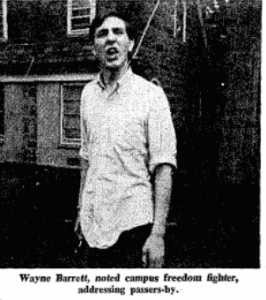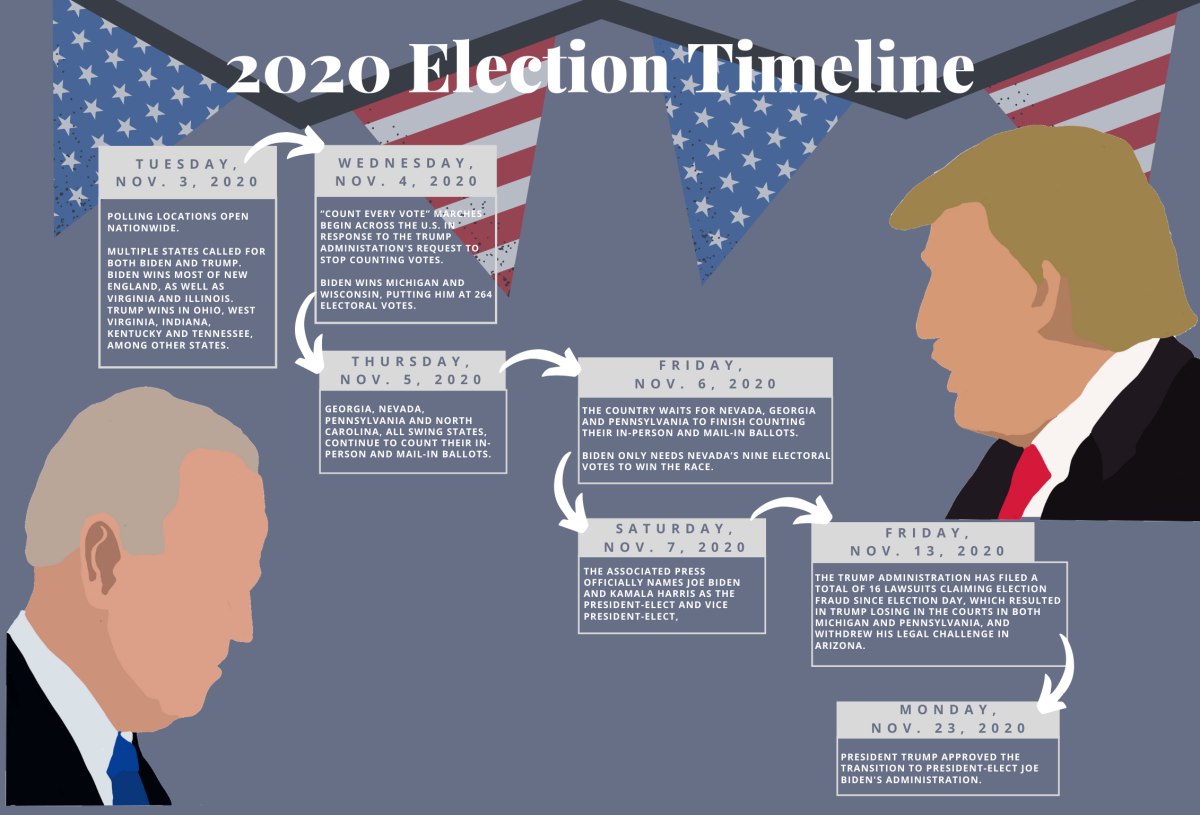Former New York City Mayor Michael Bloomberg called him “a tenacious reporter.” New York Governor Andrew Cuomo called him “a lion in the field of journalism.” The Hawk called him a “campus freedom fighter.” U.S. President Donald Trump called him a “very bad writer.”
Wayne Barrett ’67 saw himself as a “detective for the people.” That was how he announced himself to his son’s elementary school class on career day. The same phrase was strewn across pins that were handed out at his funeral. Barrett died the day before the man he tirelessly reported on was inaugurated into the Oval Office in 2017.
At his funeral days later, Barrett’s brother concluded his eulogy with “The Hawk Will Never Die.” Barrett’s work reporting on Trump throughout the 1970s, 80s and 90s has not died either. It’s been revitalized in a newly released book, “Without Compromise: The Brave Journalism that First Exposed Donald Trump, Rudy Giuliani and the American Epidemic of Corruption;” a compilation of the groundbreaking investigative pieces Barrett wrote during his career as a reporter.
Barrett wrote for the Village Voice, an alternative weekly newspaper in New York City, for nearly four decades. He essentially wrote the book on Trump, writing the first investigative biography on him, titled “Trump: The Deals and the Downfalls” in 1991. The book was rereleased in 2016. He also wrote two investigative books on former New York City mayor and Trump’s top attorney, Rudy Giuliani. The Washington Post called Barrett “a journalistic institution in New York.”
“Right up until the end, he was reporting from his sick bed to try to find out about antics that Trump was up to, to be able to dig out sources, talk to people and figure out what was going on,” said former colleague at the Village Voice and friend Tom Robbins. “Literally in the car on the way to the hospital of which he never emerged, he died a week later, he was calling sources. That just gives you an idea of just the kind of tenacity that Wayne stood for. This book, hopefully is a reminder that we need that kind of reporting in order to have a real democracy.”
Barrett’s journey found its footing at St. Joe’s in a small garage behind a residence hall. He preferred it over a dorm room, so that’s where he chose to stay. He wasn’t a man that felt the need to mold to society’s expectations.
Barrett wrote for The Hawk, ran for University Student Senate president, was class president and was president of the nationally ranked Villiger Debate Club during his four years on Hawk Hill. His passion for holding those in power accountable was bred at St. Joe’s, where the stories he wrote were critical of university administration, enough so that they had him excluded from a Jesuit Honor Society, according to his son, Mac Barrett. The decision was later overturned after backlash from the student body.
“The dispute interested me, this whole notion that I should eat my words,” Wayne Barrett told Newsday. “It also made me much more interested in journalism. I saw the power of it, I saw the effect of it, I saw that you could write something and it could shake up this community that I lived in.”

Barrett arrived at St. Joe’s from Lynchburg, Virginia as a Republican. His political adversary and good friend while at St. Joe’s, Richard George ’67, Ph.D., professor emeritus of food marketing, said Barrett was “so far to the right you couldn’t see him.”
After graduating from St. Joe’s, going to Columbia University for graduate school, then moving to Brownsville, Brooklyn to teach, somewhere along the line there was a fairly drastic shift in political viewpoints.
“Wayne’s shift really had to do at the end of the day with his feelings about race,” Robbins said. “I think that started with his being raised in Lynchburg, Virginia, where he was surrounded by a pervasive racism.”
Brownsville was one of the poorest neighborhoods in New York, which Barrett called home until the early 80s. He saw the poverty around him as a product of systemic racism, according to Eileen Markey, who edited “Without Compromise.”
“He never really left [Brownsville],” Markey said. “It was the place he was grounded, that was the place where he looked out from in his reporting. He was outraged, because he’d been standing in a place where people were poor. He knew that that was racist. He knew racism isn’t just calling somebody by a bad name, but that racism is using the structure of society and how society is organized.”
When Barrett was in the midst of one his deep dives on Trump’s finances, he was at a major New York state agency digging through financial records when the phone rang. Trump had heard that Barrett was asking questions about him, and wanted to get out in front of one of Barrett’s characteristically scathing, but truthful, stories. The two had several discussions before the subtitle of “Without Compromise” materialized: the epidemic of corruption. Barrett didn’t submit.
“Trump said to him, ‘Wayne you don’t have to live in Brownsville, I have apartments,’” Robbins said. “The message being that, ‘If you sort of lay off me I can get you a much nicer place to live.’ Wayne said, ‘Look, I’m very happy living in Brownsville, thank you very much.’”
Barrett, who Markey said was the first person to report on “Trump’s mendacity” with a series of “ground shaking articles about how his business operated,” was also probably one of the few people who wouldn’t be surprised by anything the president has done over the last four years, according to Mac Barrett. He had seen it all before.
“His opinion would be that a lot of this was in the cards,” Mac Barrett said. “You can see the same tactics being deployed that my dad wrote about when Trump was making his name in real estate in New York and New Jersey, a lot of the same methodology. What he’s done, pursuing a racist agenda that for many years had been unspoken, [Trump] gave it a voice and legitimized it.”
Mac Barrett said the rejuvenation of his father’s work in “Without Compromise” comes at a time when politics, journalism and the American people as a whole need it the most.
“It arrives at a time when the things my father stood for are routinely undermined by the White House,” Mac Barrett said. “That the facts matter and that the truth matters, and that the pursuit of the facts and the truth matter. And that more than ever, our leadership needs to be held accountable.”
Mac Barrett said his father’s book also embodies a “journalistic ethos that is, to some extent, on the decline.”
Barrett’s line of stories in The Hawk archive show how he developed a strong journalistic ethos during his four years on Hawk Hill. The stories show Barrett ruminating on what it means to hold those in power accountable, often consisting of tough questions directed at university administration.
Richard George said that while Barrett and his classmates were worried about the usual things college kids worried about, Barrett was always looking at the bigger picture. He tried to make a difference in every step of his life.
“What I remember most about Wayne from his undergraduate days, is that he was always trying to make the situation better,” George said. “‘What else can we do?’ He was talking about. ‘What can we do as an institution?’ What came through was his tireless effort to make things better.”
When recalling his colleague’s allegiance to St. Joe’s, Robbins’ voice raised an octave, imitating the way Barrett spoke about his school.
“[He talked about St. Joe’s] all the time, all the time,” Robbins said. “I must have heard about St. Joe’s every week, at least for the 30 years I knew the guy, however long it was. ‘Did you see what St. Joe’s did?’ He would get on his high horse. ‘Did you watch that game?’ He loved his alma mater. It was a very important part of his life.”
Important may be an understatement. One night Francis McGettigan ’67 was driving to her night class. Her car broke down and the first person that came upon her was Wayne Barrett, who Mac Barrett described as the “least handy person that ever lived.” He and a friend pushed her car to a mechanic and “that was the end of that,” Mac Barrett said about how his parents met.
Barrett’s impact reached the pinnacles of governmental power and Mac Barrett said that those who ended up on the receiving end of his father’s scrutinizing articles also came to respect him and befriend him.
“Mostly an endearing way, Mario Cuomo, former governor of New York liked to joke that if my mother ever wanted a divorce, he would be happy to represent her in the proceedings,” Mac Barrett said.
George looked back on how he saw the beginnings of greatness in Barrett at St. Joe’s just by the way he went about his everyday life, an approach he carried with him the rest of his life. He said Barrett was the first real intellectual he’d ever met.
“If I had a chance to talk to somebody one more time, I would talk to him,” George said.
A call to action that Barrett wrote in The Hawk just before he graduated is filled with remnants of all of the values that guided him in his tireless quest to find the truth and create change in a society unwilling to do so. He wrote the following in “Parting Words: Once More with Feeling” in the May 16, 1967 issue of The Hawk.
“Men who are open to something other than self, men alive, are not happy with private gains when public commitment is possible. Men at St. Joseph’s who want both to care and to realize change, constructive and perceptible, cannot see themselves as simply 4 year passers-by’s here. Theirs’ is the challenge to involvement, with the possible reward that their involvement will ‘matter.’ Theirs’ is the opportunity for personal meaning in its only conceivable context: community.”
























































